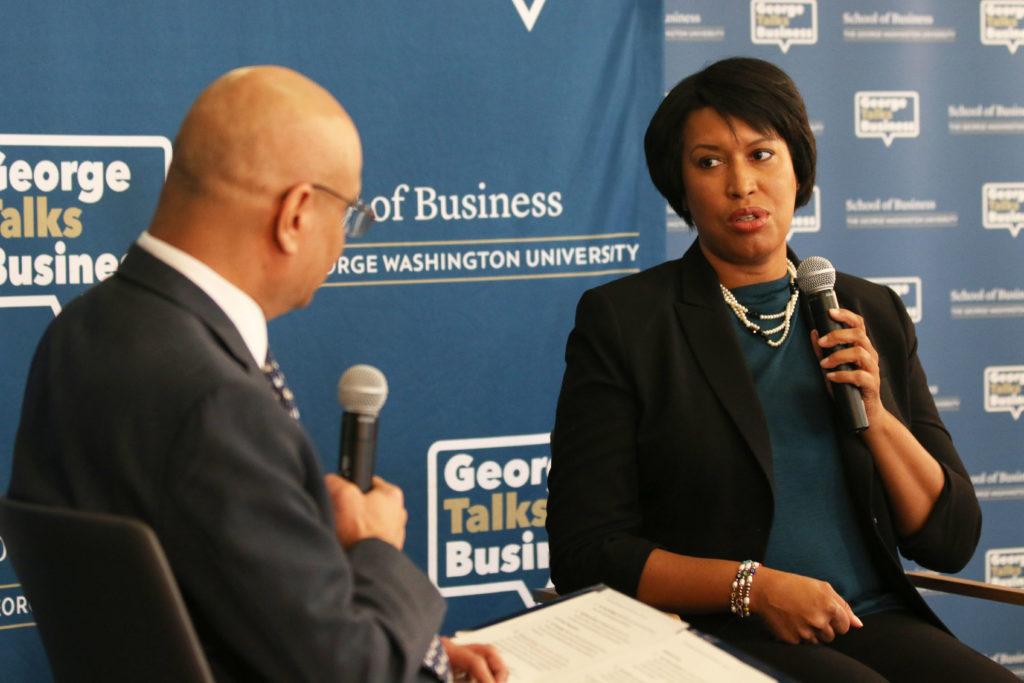D.C. Mayor Muriel Bowser discussed the city’s economic development and obstacles to achieving statehood in Duques Hall Monday.
Bowser, who was re-elected as mayor last year, spoke with School of Business Dean Anuj Mehrotra and took questions from the roughly 70 attendees at the event about her tenure as mayor. The interview was the final installment of the fall semester’s George Talks Business series, which launched in the spring to bring together the business school community.
“There’s a rhythm to being mayor and this is my fifth year of being mayor, so I get the rhythms of the job,” Bowser said.
In case you missed the event, here are some highlights:
Developing a robust economy
Bowser said that in light of Amazon’s plan to construct its next headquarters less than three miles outside the District in northern Virginia, D.C. universities should focus on creating a “pipeline” to benefit from the opportunities Amazon has to offer. Officials created a University task force to place students, faculty and alumni in a position to benefit from the new headquarters shortly after the retail giant announced its plans a year ago.
“I think Amazon is very good for our region, because it is going to attract tens of thousands of high paying jobs, and that is critical to how our region moves forward – not just D.C., but the surrounding area,” Bowser said.
She added that her administration is working to enhance the accessibility of public transportation for workers through moves like pushing to restore the Metro’s late-night hours. Bowser’s administration temporarily nixed the costs of riding the D.C. Circulator earlier this year before the D.C. Council rejected a budget request to make the initiative permanent.
“Its detriment is that it doesn’t operate in a way that a growing city is operating,” she said about the Metro. “We need longer hours.”
Becoming the 51st state
Bowser said the District is “disadvantaged” by its lack of voting representation in the House of Representatives and the Senate because residents are without a way to make their voices heard about political priorities.
“We know we are disadvantaged in a 4 million-person region by having four senators when we should have six,” Bowser said of the greater D.C. area. “Whether it’s transportation or housing, schools – critical issues for our entire region would benefit from two more voices in the Senate.”
She said D.C. officials rely on Congress to replenish the District’s Emergency Planning and Security Fund, which provides funding for local law enforcement to assist high-profile events like inaugurations and state funerals. President Donald Trump’s July 4th celebration depleted the fund earlier this year.
But Bowser added that officials must rely on the congressional delegations from Maryland and Virginia to advocate for the needs of the District like replenishing the fund since D.C. lacks voting members in Congress. Rep. Eleanor Holmes Norton, D-D.C., serves as the District’s non-voting delegate in the House.
Serving as mayor
Bowser said one of her top goals as mayor has been to meet residents by attending a meeting held by each Advisory Neighborhood Commission in the District. Bowser spoke to residents at the Foggy Bottom and West End Advisory Neighborhood Commission about homelessness and overcrowding at local schools last month.
“Being mayor is largely rewarding,” she said. “I tell people that if you can be mayor of your hometown, it’s about the best job you can have if you are interested in public service.”
Bowser added that her “coverage” and “scrutiny” is more intense than some other mayors because she essentially functions as a governor in addition to heading up a city.
“I learned pretty quickly that the best ways to make change the fastest for the most people was to be an elected official, and in D.C. that is even more true because we are a city, county, state, school district – totally unique in the American system of government,” she said.
Bowser said anyone who wants to run for mayor needs “courage” so they are prepared to tackle the tough challenges of the job.
“If you talk to anybody who sat in the seat, the ability to make tough decisions is the most critical part of being a mayor,” Bowser said.




